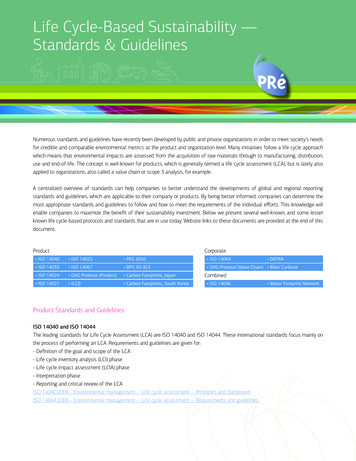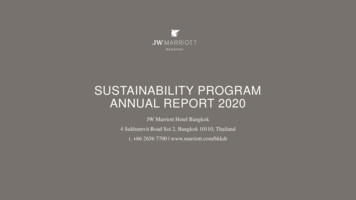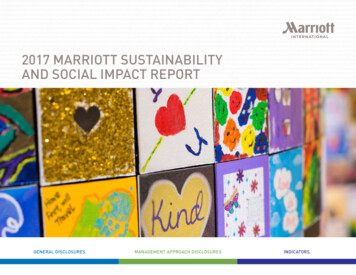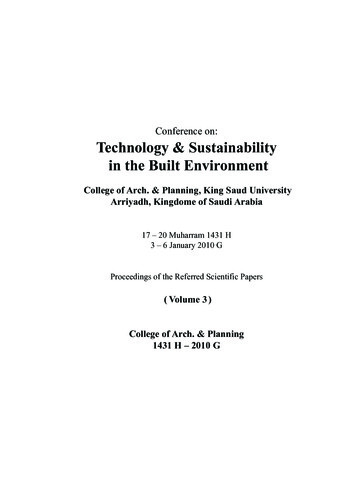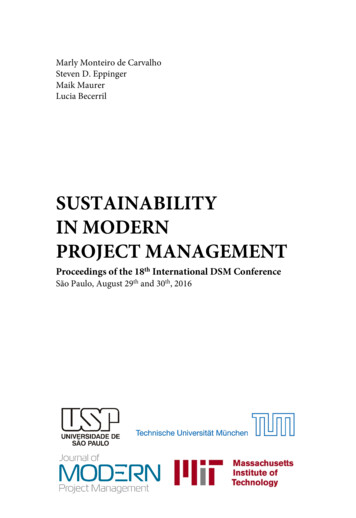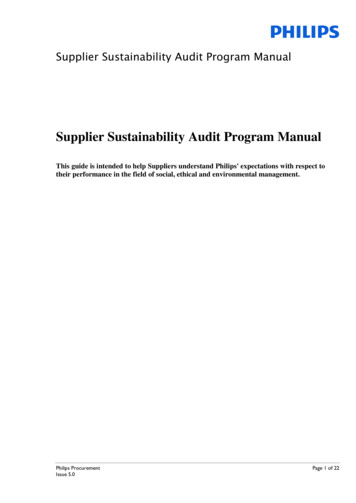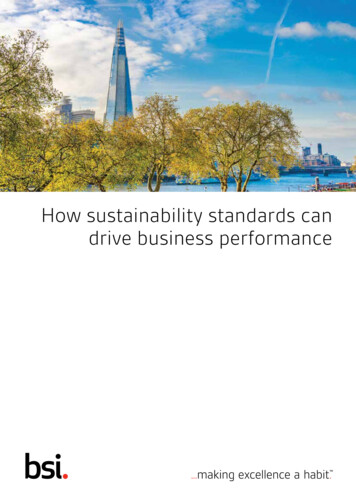
Transcription
How sustainability standards candrive business performance
How sustainability standards can drive business performanceHow can standards bring consistencyand scalability to sustainability programmes?The UK business community has long used standards to improvethe quality and performance of its products, reduce risk and supportreputations. Standards, which can be defined simply as ‘agreedways of doing things’, have provided firms with guidance to helpthem create repeatable procedures to minimize risks and operatemore efficiently.Particularly in sectors highly regulated at UK and EU level,standards have been key agents in consistently preventing pollution,meeting regulatory compliance and supporting good stakeholderrelations. Standards, including rules, guidelines and definitions,have also become recognized indicators of quality and safety.Since the headline issue of sustainability contains facets ofrisk management, operational excellence, environmental andstakeholder management, how are businesses using standardsto support sustainability? And what is the potential of standardsto help make UK businesses more sustainable?To answer these questions, we commissioned independent analystfirm Verdantix to undertake an independent, anonymized phonesurvey with 150 sustainability executives in the UK. Respondentsspanned 20 industry sectors and came from firms with more than 350 million in annual revenues. We probed respondents aboutwhat sustainability means for their business, how it is managed attheir firm and how they are leveraging standards to support it.Firms need to connect sustainability to business performanceOver the past decade, UK corporates have been buildingsustainability programmes to manage their environmental impacts,reduce resource use and improve their social responsibility. As manylarge firms move into the second decade of their sustainabilityprogrammes, how far are sustainability visions translating intomeaningful and effective actions? The primary finding of this survey is that, although sustainabilityis highly relevant for most large firms in the UK, the uniformityof responses to high-level questions hides an underlying variety.Companies differ in their approach, maturity, interest fromexecutives and resources available for sustainability. Long gone are the days when sustainability equated to costreductions and a CSR team operating in a silo. This is illustratedby the fact that 70% of the survey respondents told us thatexecutives at their firm view sustainability as a driver for growth(see Figure 1). Firms are also investing in internal teams to manageand deliver sustainability; 81% of the respondents said they havemore than five staff members dedicated to sustainability at aprogramme management office at HQ level (see Figure 2). Clearly the majority of firms see sustainability as a driver ofgrowth, but does this mean sustainability is now seen as acomponent of overall financial and business performance? Despitethe majority of firms saying sustainability is well established intheir business (70%), only half of the respondents believe thatsustainability issues will impact their firm’s financial performanceover the next two years (51%) (see Figure 3). The rest of the firmshave yet to establish a direct and immediate connection betweensustainability and business performance. They see sustainabilityas impacting performance against non-financial metrics such asenergy, environment and social responsibility (36%), or as a longterm business viability issue (13%).Figure 1What best describes what sustainability means to your business?Sustainability is well established in our business and is recognizedby our top executives as a driver for innovation and growth70%Sustainability is considered as a growth driver by only a limited numberof executives and is not integrated within the overall business strategy25%Sustainability is regarded as a minor reputational issue and receiveslittle executive attention5%Sustainability is a new concept for our business and we are stilltrying to understand what it means for business performance1%2N 150
bsigroup.comFigure 2Thinking about how your firm manages sustainability, which of theseorganizational elements does your firm have?N 15085%Cross-functional sustainability committee chaired by a Board directorSustainability program management office at HQ level with morethan 5 employees81%Sustainability leader who reports into a member of the executivecommittee (other than the CEO)74%Sustainability leader who reports directly to the CEO67%Environment Health & Safety Director at the HQ level65%Sustainability program management office at HQ level withfewer than 5 employees17%Figure 3How important is sustainability to the financial success of your firm?N 150Sustainability describes energy, environment and sustainability factorsthat will impacts our firm’s financial performance in the next two years51%Sustainability describes our performance on non-financial metrics suchas energy, environment and social responsibility36%Sustainability describes the long-term viability of our organization inthe context of natural resource scarcitySustainability will have no impact on the financial success of our firm The real indicator of commitment to sustainability is how manyresources firms are putting behind management plans andprogrammes. We heard from 37% of firms that sustainabilityspend will remain flat in the next financial year (see Figure 4).The rest of the firms are confident of budget increases: 31% saidthey expect an increase of up to 5%; 23% predict an increase of5–10%; and 1% believe there will be an increase of 10–30%. Somefirms (7%) were unsure what would happen with budget sizes.With sustainability budgets mostly looking set to remain flat orexperience single digit growth, sustainability executives have to besmart about how to deliver on corporate goals related to energy,water, waste and resource consumption. One of the principal waysto make progress has been to embed sustainability metrics orKPIs into the entire business management.13%0% Most firms are also allocating resources to enable morecomprehensive and accurate reporting on sustainabilityperformance. Sustainability reporting is now standard practicefor large UK firms: 100% of the surveyed firms said they plan topublish a sustainability report in 2014, and 91% will integratefinancial and sustainability data into their annual report (seeFigure 5). The most commonly reported sustainability datawill be carbon emissions (99% of firms plan to report on this),energy (98%), and social responsibility (93%) (see Figure 6). Agood majority will report on waste (77%), water (77%) and othergreenhouse gas (GHG) emissions (77%). These results are tobe expected as there has been a mandatory GHG disclosurerequirement for listed firms since October 2013.3
How sustainability standards can drive business performanceFigure 4In your firm’s next financial year, how do you expect budgets will change for sustainability?N 150More than 30% increaseMore than 10% increase but less than or equal to 30%1%23%More than 5% increase but less than or equal to 10%31%Up to 5% increaseNo change37%DecreaseDon’t know7%Figure 5Which of the following corporate sustainability reporting activitiesdoes your firm plan to undertake in the next financial year?N 150Publish an annual sustainability report100%Include sustainability information in our annual report97%91%Integrate financial data and sustainability data in the annual report89%Communicate our sustainability performance to institutional investorsApply the GRI (Globe Reporting Initiative) framework to oursustainability reportPay for external assurance of our entire sustainability reportPay for external assurance of our GHG dataOtherNo external reporting on sustainability483%79%71%
bsigroup.comFigure 6What types of sustainability data do you report on publicly?Carbon emissions99%Energy98%Social responsibility93%Waste77%Water77%Other GHG emissionsBiodiversityN 15077%64%Sustainability leadersA few notable firms, such as BT, HSBC and Marks & Spencer havewidely publicized, bold sustainability agendas and ambitious plansto try to align commercial performance with sustainability. Thesefirms often take long-term approaches in their sustainabilitystrategies, and are prepared to invest beyond the quick wins such aslighting upgrades. Hallmarks of leadership are high executive accessfor the sustainability departments, long-term sustainability plansand high budgets for sustainability. Out of our survey-base, a smallsample (9%) of the respondents saw the CFO financial hurdle as aninsignificant barrier for investments in sustainability (see Figure 7).The results of the survey show a broad acceptance amongbusinesses that sustainability is a relevant issue. Most firms havededicated sustainability teams and are reporting performanceon sustainability metrics such as energy, carbon and socialresponsibility. While most firms began their sustainability journeyover a decade ago, they have plenty more to do before sustainabilitybecomes business as usual. Our interviews showed that firms havenot yet converged onto a set of standardized best practices, but areat different stages of maturity, which can broadly be grouped into:Figure 7Please rank the significance of the following barriers to investingin sustainability initiatives at your organizationSustainability function lacks executive access32%Business case lacks quantifiable benefitsLack of internal expertise on sustainabilityNote: one respondent was unable to rank the responses13%23%Financial return is below CFO requirementsSavings are too small compared with other potential savingsN 14921%19%1 (most 21%28%17%9%11%49%21%26%5 (least significant)5
How sustainability standards can drive business performanceCompliance-centric firmsAn analysis of the survey results finds there is a further group offirms with compliance-centric approaches to sustainability. Theytypically use sustainability measures to ensure they meet legalobligations, and avoid risks of a bad reputation due to a poorenvironmental record. Sustainability officers for these firms oftenlack executive access and this prevents sustainability programmesfrom maturing. Out of our respondent-base, 32% of firms identifiedthe sustainability function lacking executive access as the mostsignificant barrier to building out sustainability programmes.Sustainability opportunistsOur survey found there is a group of firms where green practicesare limited to those that are low cost, low risk and little disruption.They are looking to sustainability to drive cost savings and boosttheir reputation. This view of sustainability was common amongour respondent-base. When we asked respondents to tell us thesignificance of six investment drivers for sustainability at their firm,40% ranked reputation benefits in first or second place; and 39% offirms put cost savings in first or second place (see Figure 8).Figure 8Please rank the importance of the following factors for yourorganization when looking to invest in sustainability initiatives?Alignment with company’sbusiness goalsCost savingsCompliance with legislationInnovationRisk mitigation26%25%Reputational benefits23%17%24%15%15%15%13%15%13%14%1 (most significant)N %41%18%21%12%317%11%20%5 (least significant)Standards have been agents of changefor environmental and product quality managementAs firms try to make progress on the pathway to sustainability theywill face many challenges. Often, limited budgets and executiveinterest are the barriers to action, along with a lack of clarity aboutthe steps businesses should take to make themselves more sustainable.This highlights the potential of standards to improve sustainabilityperformance and efficiency through repeatable procedures andprocesses. So how exactly are UK firms leveraging standards tosupport sustainability programmes? I t was clear from speaking to the 150 sustainability executivesthat there are two ubiquitous standards related to sustainability:ISO 14001 for environmental management and ISO 9001 for qualitymanagement. In 2014 almost all the firms we interviewed (97%)will implement the ISO 14001 environmental management systemstandard which was first published in 1996, in response to concernsabout environmental degradation (see Figure 9). Firms told us thisstandard was particularly useful to keep on top of compliance.As one respondent told us: ‘for our firm, using environmental standardsis a requirement to make sure we are not deviating from the rules’.6 But what about plans beyond these two widely recognized standards?A review of our survey results finds industrial and technologyfirms will lead the uptake in the much newer ISO 50001 energymanagement standard in 2014. This is unsurprising given thatenergy-intensive sectors have more to gain from driving consistentenergy management processes into their multiple business unitsand supply chains. Despite good levels of awareness, very few ofthe firms we spoke to plan to implement the BS 8900 standardfor managing sustainable development. This standard, recentlyupdated by BSI in 2013, provides a systematic approach forcompanies to manage sustainability and a framework forembedding sustainability into everyday decision-making. We heard that firms are using standards to reach compliance levels,but also go significantly beyond. We asked the sustainabilityexecutives: ‘What benefits does your firm gain from implementingsustainability standards?’ Responses highlighted four types of benefits:1) improving business and sustainability performance; 2) creatingformal processes to implement sustainability; 3) supportingcompliance with legislation; and 4) meeting requirements from clients.
bsigroup.comFigure 9To what extent will your organization invest in the followingsustainability standards in the next financial year?N 150ISO 14001 Environmental management89%ISO 9001 Quality management82%ISO 50001 Energy managementISO 14064 GHG managementPAS 2060 Specification fordemonstration of carbon neutralityISO 20121 Event sustainabilitySA8000 Social AccountabilityGHG Corporate ProtocolISO 26000 Social responsibility(Not currently certifiable)BS 8900 (Not currently certifiable)8%14%13%11%7%5%33%64%28%71%7%1% 5%68%3%79%My firm plans to certify to the standard with a third party certificationMy firm plans to implement the standard with no third party %17%25%18%47% I am aware of the standard, but my firm does not plan to implementthe standard in the next financial yearI have no awareness of the standard7
How sustainability standards can drive business performanceUK firms should use standards to raise the operationaleffectiveness of their sustainability programmesWidely adopted standards such as ISO 14001 and ISO 9001 havebeen important drivers of change in promoting environmentalmanagement and better quality management across industry.But other standards related to sustainability, such as BS 8900for sustainable development, have not yet achieved widespreadimplementation. Here are our top recommendations on howcorporates can use standards to put sustainability into operation: Leverage standards for integration and consistency,not isolated campaignsLarge firms have multiple layers of complexity, from distributedand varied facility types, to different strategic business units thatneed to engage with a single narrative on energy, environmentand sustainability. For example, IT services firm Dimension Data,which operates four offices and a data centre in the UK, needsto involve various divisional leads to incorporate sustainabilitymanagement into its operational excellence plan. The repeatableprocesses and procedures that follow from the implementationof standards provide the underlying structure for all the differentbusiness units to be able to implement and report on the KPIsderived from the single corporate vision on sustainability. Use certification to demonstrate best practice to stakeholdersMounting pressure from regulators, stock exchanges, customers,competitors and not-for-profits means almost all of the respondingfirms in our survey are now disclosing data on environment, energy,governance and social issues. Certification to standards, suchas those developed by BSI or the International Organization forStandardization (ISO), is a recognized way todemonstrate commitment to continual improvement across areassuch as environment, quality, sustainability and supply chain. Itis particularly important for firms selling sustainability services,such as property consultancy GVA Grimley, to communicate thiscommitment externally. Use management systems to move from compliance tooptimizationFirms operating in heavily regulated sectors, particularly basicresources, chemicals, construction, oil and gas, and utilities,have often used standards to put in place internal practices toreduce the risk and cost of operational mishaps. Building on this,these firms should look to use standards above local compliancerequirements and target improving the environmental efficiencyof their operations. With sustainability performance also creepinginto requests for proposals (RFPs), clients increasingly will requirefirms to go beyond regulation-specific compliance towardsstrategic, globally consistent offerings that integrate new ideassuch as the use of renewable energy.Standards can form a key pillar for firms at all stages of sustainabilityMost large UK firms now have a decade of sustainability managementunder their belt. They are now grappling with how to progress theirsustainability programmes and translate sustainability into businessvalue. Our experience shows that standards can support theprogress of sustainability for firms at all stages: Sustainability leaders can leverage standards to deliversustainability at scaleGiven the dynamic nature of what sustainability means to business,what constitutes a leader is always changing. Even firms leadingthe way must continue to look for the next step. A classic problemis how to follow up a series of pilot projects to reach sustainabilityat scale. This can be facilitated by using standards to drivealignment and consistency. This has been demonstrated by Marks& Spencer’s leveraging of the BS 8903 sustainable procurementstandard to support its clear firm-wide vision of sustainableprocurement embedded throughout the business.8 Opportunists can put in place procedures and a systematicapproach for sustainabilityOur survey found that the majority of UK firms are cost-benefitopportunists when it comes to sustainability. These firms shouldlook to the guidance provided by management systems to helpdrive efficiency improvements. For example, the ISO 50001energy management system, which uses the ‘plan-do-check-act’continuous improvement methodology, drives energy managementup the corporate agenda and encourages firms to think morestrategically about energy management – all in order to identifymuch greater savings, and consistency of performance. Immature firms can use management systems to meet legalrequirements consistentlyFirms with a compliance-centric approach to sustainability canuse management systems to ensure they meet legal obligations,and avoid risks of a bad reputation due to a poor environmentalrecord. For example, the ISO 14001 environmental managementsystem makes organizations ready to respond to the environmentalcompliance issues they face. It also helps firms put in place targetedinitiatives for reducing raw material use, energy consumption anddisposal costs.
bsigroup.comCase studyJaguar Land RoverJaguar Land Rover (JLR) is the UK’s largest automotive manufacturerand it employs 26,000 people worldwide. In the UK it has acorporate headquarters, three manufacturing facilities and twoproduct creation/testin
energy, environment and social responsibility (36%), or as a long-term business viability issue (13%). 2 How sustainability standards can drive business performance What best describes what sustainability means to your business? N 150 Figure 1 Sustainability is well estab

